Faith and Politics

I’m asked pretty often what I see for the future of organized religion, and Christianity in the West in particular. Given the fact that I am in the process of completing a book called “ postChristian ,” some people make assumptions that I am convinced it’s all going away.
Granted, Christianity has experienced precipitous decline, and the drop-off likely is far from done. Before we see any leveling-off within the institutional church, there will be many more church closures, consolidation of shrinking denominations, and an increasing number of people called to, and already working in, ministry who supplement their income with some non-ministerial side vocation.
So what do we, who still operate within the system of a declining religion, do about our situation? Some of this has little or nothing to do with anything the church has done or can do. Our increasingly distributed, decentralized, and accelerated culture has forced churches out of the center of American social life. Also, changing cultural norms have made it much more socially acceptable not to go to church.
I’ve long suggested that many of the folks filling the pews during the so-called heyday of the Church some 40 to 60 years ago were there under some duress. They went because of community pressure to do so, because their spouses made them, or because it was a great place to do business networking. But honestly, were we any better off as a faith to have our buildings full if the folks who were there didn’t really want to be there?
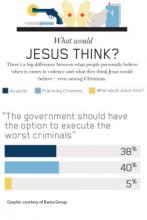
One day after the state of Ohio executed a man for murder, a new poll shows younger Christians are not as supportive of the death penalty as older members of their faith.
When asked if they agreed that “the government should have the option to execute the worst criminals,” 42 percent of self-identified Christian boomers, born between 1946 and 1964, said “yes.” Only 32 percent of self-identified Christian millennials, born between 1980 and 2000, said the same thing.
The poll conducted by Barna Group this past summer and released to Religion News Service Friday, surveyed 1,000 American adults and has a margin of error of plus or minus 2.6 percentage points.
It showed an even sharper difference in support for the death penalty among “practicing Christians,” which Barna defined as those who say faith is very important to their lives and have attended church at least once in the last month. Nearly half of practicing Christian boomers support the government’s right to execute the worst criminals, while only 23 percent of practicing Christian millennials do.

Many of us may not know what it is like to be hungry, to regularly miss meals, or to consume a diet void of essential nutrients to live a healthy life. Poet, diplomat, and politician Pablo Neruda captures this feeling well in his poem “The Great Tablecloth.” Just before the holidays, millions of Americans learned what some aspect of hunger felt like as they saw a reduction in their SNAP (formerly food stamp) benefits.
On Nov. 1, every SNAP household saw its grocery budget reduced when an $11 billion cut went into effect — the equivalent of 10 million food stamp meals a day. And the program isn’t out of the woods yet. The House and Senate have begun to finalize a farm bill that will impact vital anti-hunger programs. A compromise proposal expected in the coming weeks could further cut SNAP by as much as $8 billion, at a time when lawmakers need to protect and strengthen it.
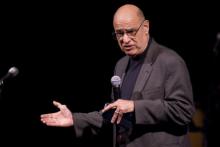
Tony Campolo, a progressive evangelical leader who counseled President Bill Clinton through the Monica Lewinsky scandal, announced that the organization he founded nearly 40 years ago will close on June 30.
Campolo, 78, plans to retire with the closure of the Evangelical Association for the Promotion of Education, but he will continue to write and speak, with nearly 200 engagements scheduled for 2014. He said his health is fine and he wants to write one more book on how Christianity fits with the social sciences.
By June, Campolo said he anticipates there will be about $300,000 left to distribute to the off-shoot ministries started by the larger EAPE. The 22 ministries that were started under EAPE now operate independently and will continue, including Red Letter Christians, where Campolo plans to spend most of his time.

Global religious hostilities reached a six-year high in 2012 and affected more people than government curbs on religious freedom, according to the Pew Research Center’s latest report on religious restrictions around the world.
The report, released Tuesday ahead of National Religious Freedom Day on Thursday, shows that 74 percent of the world’s population experienced high levels of social hostility toward religion, up from 52 percent in 2011.
The sharp rise is due to hostilities in China, which for the first time in the survey’s six-year history, scored a “high” level of religious strife. Home to more than 1.3 billion people, China experienced an increase in religion-related terrorism, mob violence and sectarian conflict in 2012.
The greatest levels of social hostilities toward religion were felt in Pakistan, Afghanistan, India, Somalia, Israel, and Iraq, according to the report.
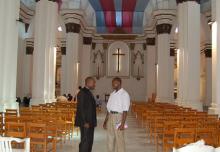
Church leaders in Libya remain hopeful that Christians in the mostly Muslim country will be allowed to practice their faith, even as the country appears to be moving towards Shariah law.
In December, Libya’s General National Congress voted to make Shariah the source of all legislation and institutions. The vote came amid international concerns over the diminishing Christian populations in North Africa and the Middle East, and increased Islamist influence in countries engulfed by the Arab Spring revolution.
Libya has undergone a two-year transition since 2011 when demonstrations toppled Moammar Gadhafi. Before the revolution, Christians were granted religious freedom, but with the change of power, they have been arbitrarily arrested, attacked, killed, and forced by the Islamist groups to convert to Islam.

IN TERMS, America has tried to heal itself. The Civil War took place in the 1860s. The civil rights movement took place in the 1960s. From America’s two biggest domestic conflicts emerge three main elements: the first, a group of people, primarily white, the majority and ruling group in society. Let’s call this group the “Land of the Free”; the second, also a group of people, but a minority, primarily black, originally from Africa, the “Other America”; and the third element of our simplified history is the slavery and poverty that divides the first group from the second and which we will call the “Wall.” ...
There are several questions I must ask myself if I am to be a Christian in America today. One that gives me a great sense of urgency is this: “If change only comes after confrontation and violence, what type of confrontation is needed to make the country livable for all people?”
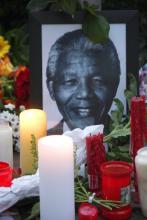
NELSON MANDELA was the most important political leader of the 20th century. While Roosevelt and Churchill helped protect the West and the world from Hitler’s Nazism, Mandela heroically exemplified the movement against the colonialism and racism that oppressed the global South, shown so dramatically in South Africa’s apartheid. And from a Christian point of view, he combined justice and reconciliation like no other political leader of his time, shaped by the spiritual formation of 27 years in prison.
Shortly after Mandela was released from prison, he came to New York to meet with a small group of Americans who had been involved in the anti-apartheid struggle, and I was blessed to join them. From the start, I felt in Mandela a moral authority I have never experienced with any political leader.
Attending Mandela’s inauguration in 1994 was a highlight of my life. We were picked up at the airport by friends, a couple who had both been in prison and tortured, but now she was about to become a member of the new South African parliament. We saw a group of the infamous South African security police. Having been interrogated by these thugs before, I immediately said, “Let’s get out of here!” To which they replied, “Don’t worry, Jim, they’re ours now.”
At the ceremony, joined by my South African friends, we watched Nelson Mandela announce his vision for a new rainbow nation. More than 100,000 people (and a billion or so more via TV) listened with tears in their eyes and great hope in their hearts.
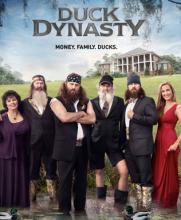
I know. We’re all a little fatigued about the Duck Dynasty and freedom of speech controversy. As many have pointed out, everyone has been free during this controversy. Phil Robertson was free to make his statement to GQ. GQ was free to publish it. A&E was free to suspend Robertson for making comments that it thought hurt its image. And, despite that justification, A&E is free to air Duck Dynasty marathons on Dec. 24 and 25. (Yes, on Christmas Day you can watch 12 1/2 hours of Duck Dynasty. A&E is taking this controversy straight to the bank!) We are free to watch, or to not watch, future episodes of Duck Dynasty. We are all free to take sides. And bloggers are freely adding to our Duck Dynasty fatigue by writing endless blog posts.
This blogger asks for your forgiveness in writing yet another post that adds to our fatigue. So I’ll keep this brief.
There is something about freedom that we are missing in this debate, especially from a Christian point of view. When it comes to freedom, we want to fight for the freedom to do or say whatever we want. This is the highest point of freedom in the United States. It’s a freedom that is based on freedom for individual rights. It’s a freedom that says that I should have the right to say whatever I want without any negative consequences.
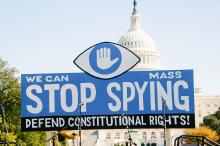
I was encouraged by the findings of U.S. District Court Judge Richard Leon on Monday who granted an injunction to plaintiffs Larry Klayman and Charles Strange that will temporarily stop the National Security Agency from continuing their data-gathering program that mines information from our mobile phone calls.
The injunction was issued because the judge believes that Klayman and Strange likely will win their lawsuit against the federal government, claiming that the phone record collection practice is an unconstitutional violation of personal privacy.
The whole storyline is made that much more dramatic since the otherwise secret program was leaked to the public by former NSA contract Edward Snowden, who is now on the run, seeking asylum in exchange for shared intelligence. And while some perceive Snowden as a hero of individual liberty, others vilify him as an enemy of the United States, much like any other terrorist. Interestingly, people’s opinions about the NSA — and, frankly, the Obama administration and the government as a whole — diverge in similar ways.

Rep. Frank Wolf, one of the loudest and most persistent voices in Congress for the right of people around the globe to practice their religions freely, will not seek an 18th term.
“As a follower of Jesus, I am called to work for justice and reconciliation, and to be an advocate for those who cannot speak for themselves,” Wolf, a Presbyterian, said in a statement Tuesday.
The Republican from Northern Virginia, who will turn 75 in January, said he will work on human rights, religious freedom, and other social issues in his retirement.
Resources that help address the modern-day "orphans in distress" in our midst

It seems like there’s nothing but bad news all around us. Congress can’t get anything done, the Middle East is in turmoil, and climate change is making natural disasters worse around the world. But a couple of weeks ago, I went to an event in Washington, D.C., hosted by the National Campaign to Prevent Teen and Unplanned Pregnancies that celebrated a major accomplishment. The teen birth rate and pregnancy rate are both down — and not just by a little bit.
The teen birth rate has plummeted by 52 percent since 1991, while the teen pregnancy rate has fallen by 42 percent. Fewer teen pregnancies mean fewer abortions, less financial strain on families, and more children being born into families that are ready to have a child.
This news came as a surprise to me, as it did to many. Seventy-four percent of adults incorrectly believe the teen pregnancy rate has increased or stayed the same. Fewer teens have gotten pregnant do to a combination of waiting to have sex until later and being more educated about the proper way to use contraception. This news doesn’t fit the current narrative that millennials and young people don’t take personal responsibility for their lives and choices.
This success is yet another example of what government, the private sector and faith community, and families can accomplish when they work together.

I WAS 7 years old when my family first opened our home to foster children. My parents were in their early 40s and already had four children at home. They were somewhat typical for foster parents at that time: married, established, often people of faith. We had a total of 10 children in our home—two of whom were adopted—from 1988 until 1997. Fostering children was a 24-hours-a-day, seven-days-a-week commitment and calling. As my mother would say, “God sets the lonely in families—but am I willing to let him set them in mine?”
This is a question that more Christians—particularly the oft-maligned Millennials—are asking themselves. They are examining both the sheer number of children growing up without families and scripture to see what it says about their faith. Taking their cue, and often their names, from James 1:27 (“look after orphans and widows in their distress”), groups in Colorado, Arizona, Oklahoma, Virginia, and most recently the District of Columbia have committed to looking after these modern-day “orphans in their distress.”
According to the Administration for Children and Families, in 2012 there were 400,000 children in foster care nationwide. Of that number, 102,000 were waiting to be adopted. Only 52,000 children were adopted in 2012; at the end of 2011, 15 percent of youth in the system lived in group homes or institutions. What is most troub-ling is the number of youth who “age out” of the system every year without the support of a family. At the end of 2011, 11 percent, or 26,000 youth in the system, aged out. These youth are much more likely to experience homelessness, health problems, unemployment, incarceration, and other trouble later in life.

TWO OF MY greatest teachers were Latin American men, both ordained as Catholic priests. One, Archbishop Oscar Romero, was assassinated in 1980. I never met him, being a 20-year-old American who’d never set foot in El Salvador or anywhere else in Latin America. But Romero made me, a lapsed Catholic, wonder why his views—our views, if Christian social teaching means anything at all—would be viewed with murderous hostility by the Salvadoran elite. After all, it was all right there in the Book. Wasn’t it?
The truth was, I didn’t know. Was it worth looking at books about these matters? That’s what we believed in medical school: Look it up! So Romero led me to the second of these teachers who, I’m happy to say, is alive and well and living (mostly) in Lima, Peru. Gustavo Gutiérrez, a diminutive and humble Dominican priest and a great friend of Romero’s, taught me through his books, from The Power of the Poor in History toWe Drink from our Own Wells, and later through his friendship and his almost mystical (to me, in any case) optimism.
Over the course of my 20s, the slender, frayed thread of my own faith, which I had believed cut, slowly came back into view. There was a filament a bit stronger than imagined, made visible in part by my Haitian hosts and patients and friends, and in part by Catholic social activists working against poverty in settings as different as tough neighborhoods in Boston, the farms of North Carolina, and the slums of Lima.
Some were nuns or priests, some were engaged laity, from many professions. Most were people living in and struggling against their own and others’ poverty. Their activism taught me a lot about a space in the Catholic Church I’d not seen clearly before, and about the promise of long-term engagement in the monumental struggle against poverty and discrimination in all its forms. That includes gender inequality, no stranger to the institution. Most of the most inspiring activists were women.
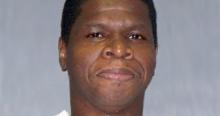
Twenty-seven evangelical Christian leaders across Texas and the United States are calling on Harris County District Attorney Devon Anderson to allow a new, fair sentencing hearing for Duane Buck. Mr. Buck is an African-American man who was condemned to death after his sentencing jury was told that he was likely to be a future danger because of his race. These evangelical Christian leaders oppose the setting of any execution date for Mr. Buck.
“We write to respectfully request that you support a new, fair sentencing hearing for death row prisoner Duane Buck,” the letter states. “Although opinions on the death penalty vary within each of our churches, we are strongly united in our view that no death sentence should be a product of racial discrimination, as it was in Mr. Buck’s case.”

In November of 1963, C. S. “Jack” Lewis knew he was dying. The Irish-born literary scholar, children’s author, and Christian apologist had come out of a coma in July, only to be diagnosed with end-stage renal failure. He retired from his post at Cambridge University, choosing to die at home in the Kilns, where he lived with his brother, Major Warren (“Warnie”) Lewis.
On Friday, Nov. 22, he retired to his bedroom after lunch. At 4:30 p.m. GMT he took some tea. An hour and a half later, Warnie heard a crash and discovered Jack unconscious. Within three or four minutes, he was dead, exactly one week shy of his 65th birthday.
A few minutes later (11:39 a.m. CST), Air Force One touched down at Love Field in Dallas, Texas, as a motorcade prepared to take President John F. Kennedy and his wife Jacqueline, along with their entourage, to the Dallas Business and Trade Mart. But the motorcade never arrived at its destination.
After the president suffered mortal gunshot wounds to the head at 12:30 p.m., his limousine rerouted to Parkland Memorial Hospital where the 46-year-old president was dead upon arrival.
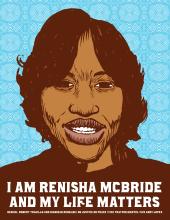
In the early morning of Saturday, Nov. 2, Renisha McBride, 19-year-old black woman from Detroit, crashed her car in Dearborn, a predominantly white Detroit suburb. Lacking battery power for her cellphone, she approached a nearby home to ask for help. Theodore Paul Wafer, a white man, answered the door. He responded to her knock by shooting a firearm through a locked screen door, striking Renisha in the face and killing her. Police initially said that the white man mistook her for an intruder and shot her in self-defense, even though Renisha was unarmed and there is no evidence of her attempting to enter the house uninvited. Two weeks passed before the Wafer was charged with second-degree murder and arrested. Wafer maintains that he acted in self-defense. If the recent George Zimmerman acquittal is any indication, it is entirely possible that justice will not come to pass.
A black woman is dead because a white man decided that she should die. A black woman is dead and there is no guarantee, that in 21st-century America, justice will be done.
This is America and this is not new.
I’d never heard of Renisha McBride until her death became a national news story a little more than two weeks ago. But in a way, I’ve known Renisha my whole life. Renisha’s story echoes the stories of black women across the arc of American history.
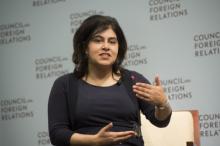
The highest-ranking Muslim in the British government on Friday called on Western governments to do more to protect besieged Christian minorities across the world, particularly in the Holy Land where they are now seen as “outsiders.”
Baroness Sayeeda Warsi, the government’s minister for faith and the first Muslim member of a British cabinet, said religious freedom is a proxy for human rights and must not be an “add-on” to foreign policy.
“A mass exodus is taking place, on a biblical scale,” she said in a speech at Georgetown University. “In some places, there is a real danger that Christianity will become extinct.”

An organization of nonbelievers is threatening legal action against public schools that participate in an evangelical Christian charity that delivers Christmas toys to poor children.
The American Humanist Association, a national advocacy organization with 20,000 members nationwide, sent letters this week to two public elementary schools after parents complained their children were being asked to collect toys and money for Operation Christmas Child.
Operation Christmas Child is a project of Samaritan’s Purse, an evangelical relief organization founded by Franklin Graham, son of evangelist Billy Graham. Its stated mission is “to follow the example of Christ by helping those in need and proclaiming the hope of the Gospel.”
The toys collected by Operation Christmas Child come with an invitation for recipients to accept Christianity. Since its founding in 1993, Operation Christmas Child has sent 100 million boxes of toys to poor children.